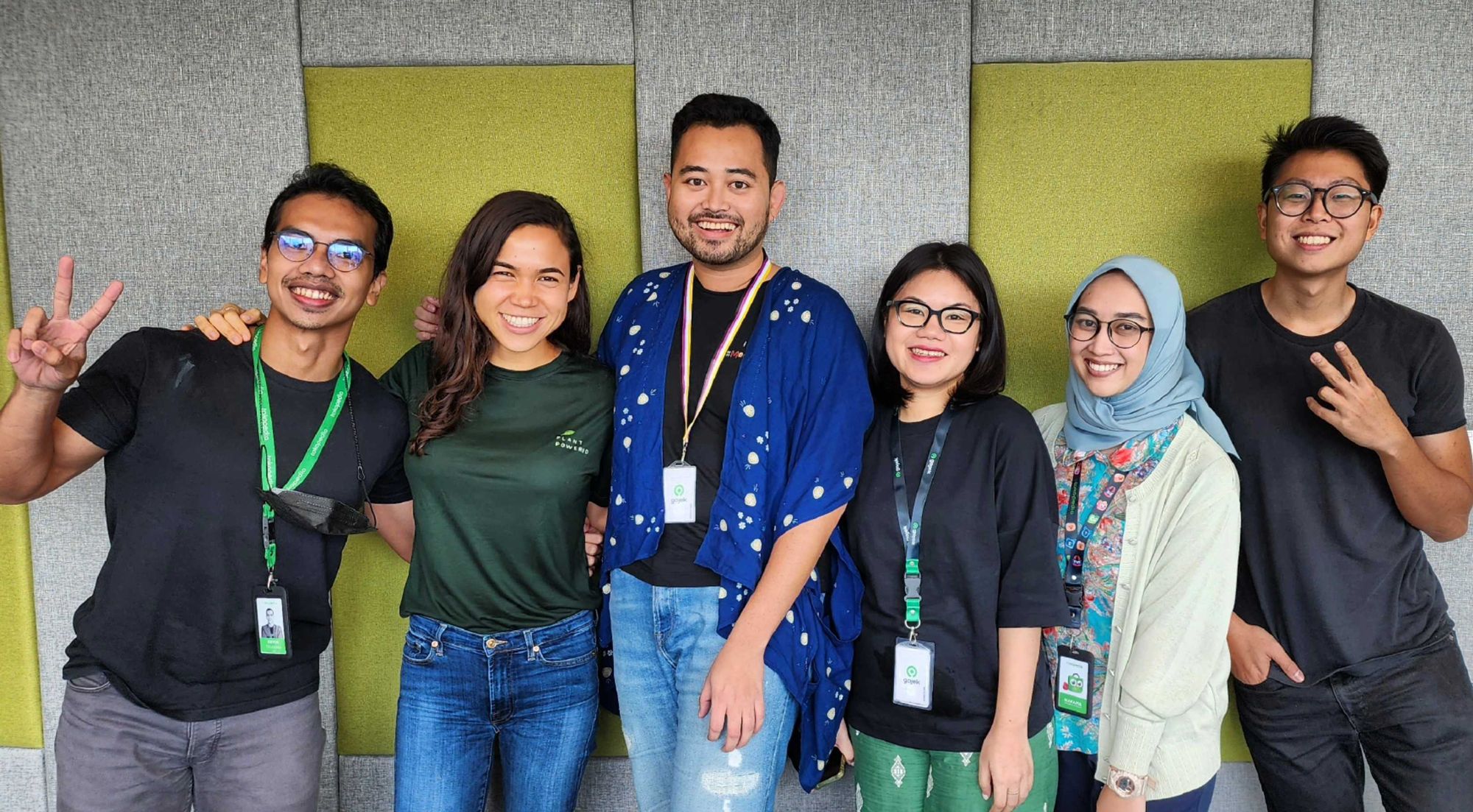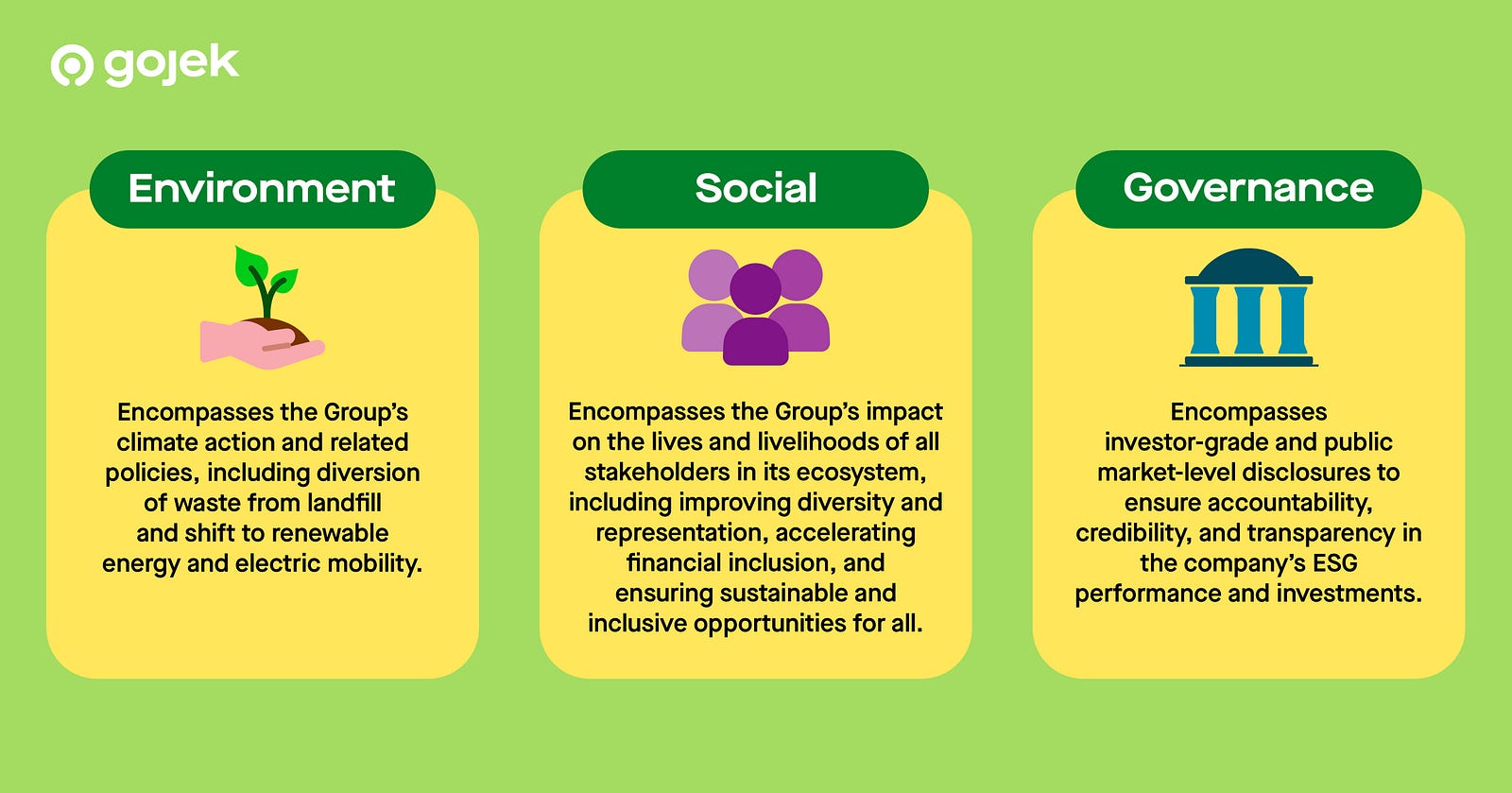By Pamela Chan
It all started with giving our mission of leaving a positive impact some hands and feet.
Before she became GoTo’s first Group Head of Sustainability in 2020, Tanah Sullivan had spent six years at the World Economic Forum tackling environmental challenges such as plastic waste pollution and social issues like gender inequality. She regularly joined forces with next-generation leaders from the region whose organizations were reshaping the business landscape and economic growth in their respective countries. Indeed, Gojek was one of these organizations.
Through years of organic conversations with GoTo CEO Andre Soelistyo, the idea of assembling a Sustainability division at Gojek was born.
Tanah recalls, “Andre shared his commitment to ensuring the company's positive environmental and social impact but wanted to approach and integrate into the business and ecosystem in a meaningful way, so we discussed what a dedicated resource might look like.” After putting together some ideas on paper and speaking with the broader Gojek leadership team, she was asked to lead the charge.
“I saw how committed Gojek’s leaders were to addressing sustainability as a company, but it’s a huge undertaking to build world-class ESG (Environment, Social, and Governance) practices in a company with already established processes, operations, and complex infrastructure, on top of a huge ecosystem,” she reveals. It was this challenge that made it all the more compelling for her to join the ride.
Sowing GoTo’s Seed of Sustainability
Even before she took the wheel, Tanah had a specific vision for Gojek’s (and eventually GoTo’s) Sustainability function:
“What we want is not to be a company with a social purpose, but a purposeful company. Not a great sustainability company, but a great company. Our goal is that sustainability should be so well-ingrained into our business operations and decisions that it isn’t a siloed thing anymore,”
It’s important to note the different shades a sustainability function can carry — from the environmental-focused teams at gas companies to investor-focused ones at multinational corporations. Tanah points out, “We’re a unique beast, a product of our organization, culture, leadership, and people in our team.”

Today, GoTo’s Sustainability function is a team of six based in Jakarta, Indonesia. The scope of their work covers the entire GoTo Group: Gojek, GoTo Financial (GTF), and Tokopedia. Taking a comprehensive scan through these entities’ business operations and corporate development, the team ensures the Group continues to grow and cut costs with credible and meaningful environmental and social considerations.
This necessitates collaborating with Corporate teams to establish proper Environment, Social, and Governance (ESG) screening processes, working with the Finance team to set feasible revenue targets in shifting operations to be more environmentally sound, and deciding which indicators to track that will adequately reflect the Group’s economic impact.

Tanah adds, “It’s not about having a document and saying, ‘This is our sustainability strategy. Just do it.’ It’s about embedding ourselves within our GoTo teams to understand their existing SOPs and apply a sustainability lens to their specific hurdles.”
Their collaborations extend beyond teams within GoTo. In fact, the GoTo Sustainability Advisory Council comprises experts from leading organizations such as the World Bank, Ellen MacArthur Foundation, ASEAN Center for Energy, and the University of Indonesia. This council helps verify that GoTo’s sustainability targets are in line with international frameworks and provides an impartial, independent assessment of GoTo’s progress.
For example, the team uses the Paris Agreement’s goal of limiting global temperature increase to 1.5°C to achieve carbon neutrality by 2030 across our direct operations (compared to the Group’s baseline of approximately 800,000 metric tons of Co2 emissions in 2021).
When Transparency Bears Fruit
The Sustainability team upholds our Group’s collective responsibility to exercise credibility and transparency in how we are aligning our ESG practices with the company’s strategic objectives, growth targets, resource allocation, and business decision-making.
The benefits of an organization being transparent with their ESG practices are manifold. Statistically, companies that perform well from an environmental and social standpoint perform financially well too. Those with strong ESG policies already in place are most resilient during disruptive times like our current COVID-19 pandemic. Additionally, as they’ve already considered their potential risk factors, these companies also fare better with investors.
Tanah maintains, “It’s important to ensure we have quantitative and qualitative data that are backed by real progress against the commitments we’ve made. Otherwise, they’re just commitments.”
Furthermore, with sustainability being a pre-competitive space, the more transparent companies are with their successes and failures, the quicker market and industry-wide changes can occur.
The ‘Three Zeros’ Updates
This transparency is exercised in GoTo’s annual Sustainability Report — the first to be compiled by a Southeast Asian internet company in alignment with globally-recognized standards. One of the highlights of the report is the announcement of the Three Zeros commitments: a GoTo-wide goal to achieve Zero Emissions, Zero Waste, and Zero (socioeconomic) Barriers by 2030.
To name just a few developments already inaugurated: shifting GoTo’s offices to 100% renewable energy, an ecosystem-wide waste inventory, transitioning to 100% recycled packaging at Tokopedia fulfillment centers, reducing excessive packaging and implementing proper waste management for GoFood orders, partnering with financial institutions in Indonesia to provide easy bank access for our driver-partners, and including accessibility features on our apps for people with visual and hearing impairments.
Under these successes are a colossal amount of hard work and persistence. “It’s about finding the sweet spot between driving down our company’s cost and making progress on our sustainability commitments because those things aren’t always moving in the same direction,” Tanah says.
For instance, a Tokopedia packaging manufacturer was spending 20% more to import cardboard due to a lack of local supply. In response, the team implemented a model for Tokopedia’s fulfillment centers to provide cardboard for the manufacturer to repurpose and then sell back to Tokopedia for their orders. “This is one closed loop,” Tanah highlights, “Now, it’s a matter of scaling this effort.”
The team must also consider the external variables that can greatly impede their efforts. Using the above example, the lack of competition for sustainable packaging makes it difficult to scale these efforts at mass production while driving down costs.
Yet, the team believes that these efforts will still move the GoTo ecosystem toward these needed changes without its members realizing it (e.g. how cutlery and condiments are no longer offered with GoFood offers). Tanah voices, “Eliminating these things from our ecosystem requires a lot of creativity and brainpower, but it’s coming together.”
What’s To Bloom
Though the team has come a long way since its beginnings in 2020, the road ahead is still riddled with challenges. “We’ll have to pivot many times,” Tanah expresses, “Our roadmaps must be dynamic because of the advent of new climate tech or how far our new financial products can bring our partners from a socioeconomic perspective.” Thus, they conduct regular assessments throughout the year to determine whether to change, drop, or continue pursuing a strategy.
The team continues to work across GoTo’s various business units to launch new products and channels that will foster greater collective action amongst users, employees, and partners alike. Their goal for this year: To make the Three Zero commitments more palpable in our daily lives.
Through exercising courage, collaboration, and creativity on a daily basis, the Sustainability team demonstrates that no problem is too big when the right hearts and minds, coupled with the right motivation and urgency, are working together to respond to the challenges affecting our communities and planet.
Tanah ends with her mantra to the team: “We need to give it everything we’ve got and persist until we get it right, because there’s too much at stake for us as individuals, as an organization, and ecosystem if we don’t.”

Find more stories from our vault, here.
Check out open job positions by clicking below:


